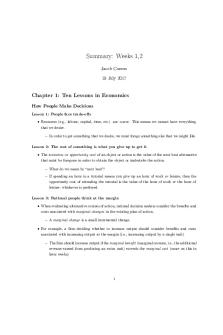Chap 43 Summary PDF

| Title | Chap 43 Summary |
|---|---|
| Course | Issues In Criminal Justice, 1St Term |
| Institution | John Jay College of Criminal Justice |
| Pages | 3 |
| File Size | 102 KB |
| File Type | |
| Total Downloads | 80 |
| Total Views | 146 |
Summary
Summary of Chapter 43 "Outsiders: Studies in the Sociology of Deviance" from "Classics of Criminology" text 1577667360...
Description
Chapter 43 Summary CRJ 710-02 For many decades, criminologists viewed deviant behavior as breaking or going against an agreed upon rule or system of rules in a society or group, and this view has been the basis of many studies and research projects conducted on crime and deviant behavior. In 1963 Howard S. Becker wrote his work Outsiders: Studies in the Sociology of Deviance, and posed a new way to view deviant behaviors. He stated that deviance itself is only able to exist because society allows it by creating a structure of rules or laws to be followed, and when they are inevitably broken, society is able to create a group of “deviants” (Becker, 1963). It is often said that society creates deviance through social institutions and many “social factors push individuals in that direction. But Becker states that societies first create rules and laws which dictate what is “good” and “bad” behavior, and when someone does not conform to these rules or beliefs society is then able to label them as “deviant” (Becker, 1963). He explains that his definition of deviance is not the act itself but instead is the consequence of society applying a set a rules to an “offender” (Becker, 1963). Societies create a set of rules and laws in order to prevent crimes or deviant behavior, and in turn create the deviance by designating a separate group of people as “deviants” or “outsiders”. Whether or not an individual is labeled this way depends on how society reacts to their behavior (Becker, 1963). For example, in today’s society, people who regularly use marijuana are not viewed as being “ as deviant” as those who use heroine regularly, because public attitude towards marijuana use has changed. Becker states that rules are the products of someone’s own initiative, and those who are involved with them are “moral entrepreneurs”. There are two important people who allow for this enterprise to continue and flourish, rule creators and rule enforcers (Becker, 1963). The
Chapter 43 Summary creator is known as the crusading reformer, only interested in the content of the rules and feels that there is an evil that needs to be vanquished (Becker, 1963). These people often believe they are doing the right thing because they feel their mission is a holy one and they are only trying to help those below them be and do better. The rule enforcers on the other hand are often apathetic and detached, and are not concerned with the contents of the rules (Becker, 1963). The pure existence of the set of rules allows for them to have a job, so they enforce them with loyalty to justify their positions (Becker, 1963). The enforcer also has the burden of gaining respect from who they are enforcing rules upon, if they were truly effective then the rules would no longer need to exist, thus making the enforcers role futile in the eyes of the public.
Works Cited
Chapter 43 Summary Becker, H.S. (2012). Outsiders. In J. E. Jacoby, T. A. Severance, & A. S. Bruce (Eds.), Classics of Criminology (4th ed., pp. 354-361). Long Grove, IL, IL: Waveland Press. (Original work published 1963)...
Similar Free PDFs

Chap 43 Summary
- 3 Pages

Summary - Chap 1,2,3
- 6 Pages

Chap 6 summary - gvhj
- 3 Pages

43
- 43 Pages

Lab Exercise 43
- 1 Pages

Unidad 43 - Núcleo Celular
- 16 Pages

Objective 43 - sdfadsf
- 10 Pages

Chap-4 - Chap 4
- 31 Pages

Chapter 43 notes
- 7 Pages

43 Aditzak baldintzak teoria
- 4 Pages
Popular Institutions
- Tinajero National High School - Annex
- Politeknik Caltex Riau
- Yokohama City University
- SGT University
- University of Al-Qadisiyah
- Divine Word College of Vigan
- Techniek College Rotterdam
- Universidade de Santiago
- Universiti Teknologi MARA Cawangan Johor Kampus Pasir Gudang
- Poltekkes Kemenkes Yogyakarta
- Baguio City National High School
- Colegio san marcos
- preparatoria uno
- Centro de Bachillerato Tecnológico Industrial y de Servicios No. 107
- Dalian Maritime University
- Quang Trung Secondary School
- Colegio Tecnológico en Informática
- Corporación Regional de Educación Superior
- Grupo CEDVA
- Dar Al Uloom University
- Centro de Estudios Preuniversitarios de la Universidad Nacional de Ingeniería
- 上智大学
- Aakash International School, Nuna Majara
- San Felipe Neri Catholic School
- Kang Chiao International School - New Taipei City
- Misamis Occidental National High School
- Institución Educativa Escuela Normal Juan Ladrilleros
- Kolehiyo ng Pantukan
- Batanes State College
- Instituto Continental
- Sekolah Menengah Kejuruan Kesehatan Kaltara (Tarakan)
- Colegio de La Inmaculada Concepcion - Cebu





